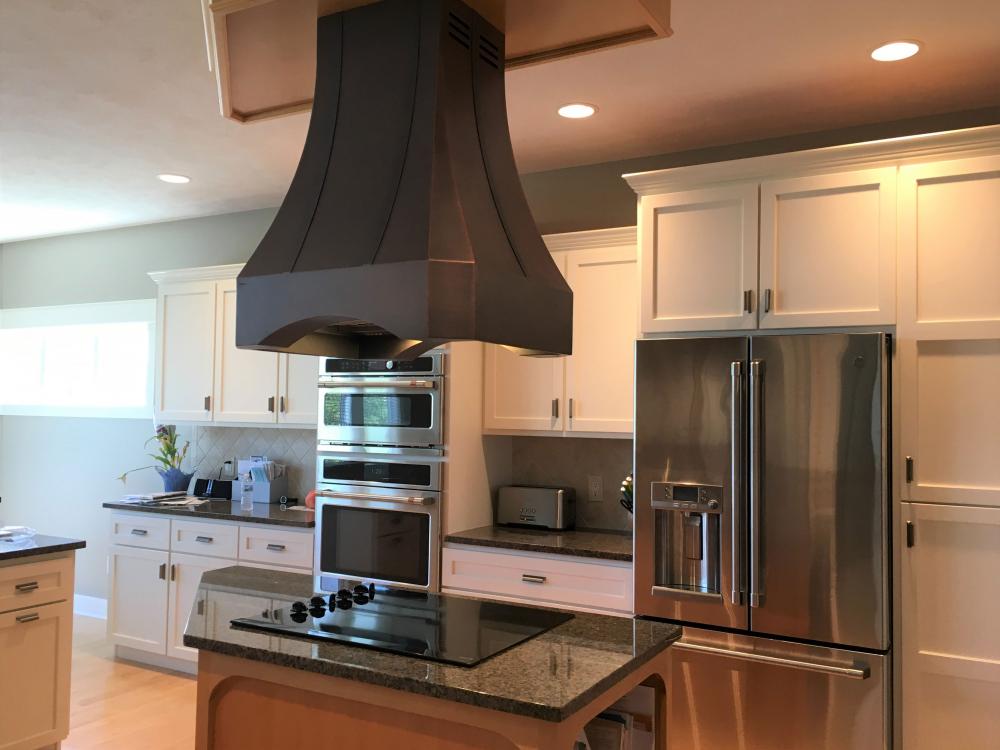Essentially, a range hood is a kitchen fixture for collecting hot air, smoke, odors, and other contaminants that may be formed when cooking. It is sometimes referred to as an exhaust hood or vent hood.

When designing a new kitchen, there are many factors to take into account, and chances are, you will have to decide what kind of exhaust hood to feature in your kitchen. While there are many different types of range hoods available today, ductless range hoods and ducted range hoods are the two most popular choices today.
If you don't know why they're called 'duct' or 'ductless', how they work, their pros and cons, or the distinction between the two range hood types, don't fret. In this article, we will look into all these to enable you to buy the right range hood for your kitchen.
Ducted Range Hood
If you've made your buying decision, or are about to purchase a kitchen exhaust with a ducted hood, here's all you need to know about exhausts with ducted hoods.
What Is a Ducted Range Hood?
A ducted range hood (also known as a vented range hood) connects to a duct via pipes and empties the kitchen of airborne contaminants. Typically, the effluents empty into the outside environment.
For the airborne particles to be transported from the kitchen to the outside, a ducted range hood needs to be linked to a duct with pipes. This working principle sets it apart from ductless range hoods, which simply recirculate air through a filter before returning to the kitchen.
However, depending on the number of ducts in your kitchen, some designs may restrict where you can put a ducted range hood. So you may need to inspect your kitchen's design and take your cooking habits into consideration to plan the duct system.
Commercial kitchens like using this kind of hood since it disperses more smoke, dirty air, and pollutants outside.
In comparison to ductless versions, ducted hood exhaust systems typically operate more quietly and effectively. However, depending on the size, type, model, and how well you maintain your hood, the noise level may change.
The Advantages Of a Ducted Range Hood
Having a ducted rangehood has a lot of advantages, such as:
Efficiency
In terms of efficiency, ducted range hoods are preferable because they totally vent the air out of the kitchen, making them more effective at removing humidity and steam from the cooking area as opposed to filtering and recirculating the air.
Better Air Quality
You will generally enjoy cleaner and fresher air in your kitchen because effluents are vented out completely, unlike ductless models.
Less Noise
On Average, ducted hoods tend to run more silently than a ductless model. However, the noise level of your vented range hood will still depend on your investment, the brand in question, and maintenance.
The Disadvantages of a Ducted Range Hood
The only drawback to a ducted range hood is that there are certain placement restrictions. It might not be the best choice for every kitchen because it needs to be built near a duct system that extends from the kitchen to the outside environment.
Ductless Range Hood
Like the ducted models, ductless range hoods strive to make your kitchen a healthier place by keeping the air in pristine condition. They only work using a different principle. Find out.
What Is a Ductless Range Hood?
Ductless hoods purify the air by capturing dirty air, pollutants, smoke, etc and passing them through a filtering medium like charcoal filters to clean it before recirculating the air back into the kitchen.
It is for this reason that ductless range hoods are also called "recirculating hoods."
But unlike ducted models, it can be positioned almost anyplace in the kitchen and is a little more adaptable. So you don't need to be concerned about placing a ductless range hood close to any pipes or ducts that reach the outdoors because it simply filters and then circulates air around the kitchen.
This makes a ductless hood potentially more practical than a ducted system, at least in terms of installation. Some ductless models can even be configured to switch on and off automatically and run on timers.
The Advantages of a Ductless Range Hood
Here are a few reasons to love ductless range hoods:
Versatility
The benefit of a ductless hood is that it can be positioned almost anywhere and is a little more adaptable since it does not require you to install ductwork.
Ease of Installation
Compared to ducted exhaust models, ductless hoods are easier to install due to the fact that they don't require ductwork.
The Disadvantages of a Ductless Range Hood
If you've been wondering, here are the drawbacks of ductless range hoods:
Typically Noisier
Due to the fact that ductless hoods frequently need a lot more fan power than ducted exhaust systems, their decibel levels may be a little higher. However, the noise level will still depend on the quality, brand, model, and size you choose.
Higher Humidity
Your kitchen may get quite humid while using this sort of hood since it circulates air rather than drawing in fresh air or venting out stale, unclean air.
Expensive Long-Term
Although many ductless range hoods are relatively cheaper than ducted models due to the fact that they don't need ductwork, the long-term cost of changing filters definitely makes them more expensive in the long run.
Ducted or Ductless Range Hood? - How to Choose
The most efficient range hoods, according to experienced chefs, are ducted models, although most domestic kitchens don't require something that powerful.
The rangehood type to use in your kitchen will be heavily influenced by your cooking style, personal preferences, and the design of your kitchen. So which one should you go for?
When it boils down to it, you have to consider a few factors when choosing a range hood for your kitchen—regardless of the type: ducted or ductless. Here are a few:
Consider the Size
The size of your kitchen should determine the size and type of exhaust hood to have in your kitchen. The range hood you choose should be large enough to catch the emissions coming from all the burners near your cooking area.
It goes without saying that the range hood won't completely remove the smoke and humidity from your kitchen if it is too small.
